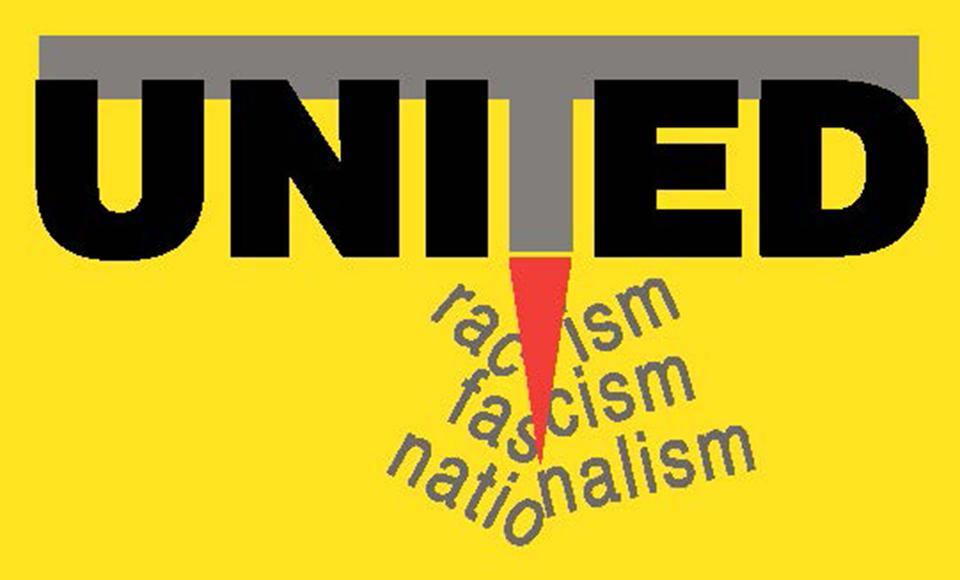Racism can only be combated by unity, that is the idea behind United for Intercultural Action (UNITED), the European network against nationalism, racism, fascism and in support of migrants, refugees and minorities. We asked Ana López Carlassare from UNITED to share thoughts about Europe’s situation from UNITED’s point of view.
In 1945, Europe thought to have defeated fascism, but nationalist, fascist, anti-Semitic and xenophobic ideologies still remain alive in today’s political rhetoric. Although the way fascism is voiced has drastically changed, the basic characteristics of fascism and the methods for gaining support from the wider public remain the same: populism is a virus. And in the whole continent this plague has reappeared, changing its colors depending on the context and has reached a strong presence even in countries with strong democratic traditions.
Fascist ideas gain support among different social groups especially in times of political and economical crisis, destroy democratic liberties and discriminate members of specific minorities and people with different views. People are looking for someone to blame. Hate not only leads to violence, discrimination and exclusion, but is a dangerous threat to democracy and peace as well.
Opinions are hardening in the public discussion
All over Europe, there are politicians who find numerous threats against their respective societies, and these threats are almost always ‘foreign’, from outside the dominant social group. According to these politicians and leaders, they are the only ones that are capable of finding appropriate ‘solutions’ to the problems in society; and they offer a solution which rejects all that is different. The hardening opinions in the field of politics make it clear, that Europe today is facing many different forms of racism, xenophobia, anti-migrant and anti-minority attitudes resulting in exclusion, hate speech, and in extreme cases in hate crimes.
Fallout from the on-going economic and fiscal crisis, coupled with the heightened threat of terrorism, and the high number of refugees and migrants arriving on Europe’s shores, have combined to create an atmosphere in which racist rhetoric and far-right extremism are thriving. As multiple crises engulf Europe, many people are questioning their commitment to the shared European values of democracy, human rights and tolerance that have been at the heart of the European project since the end of the Second World War. Meanwhile, a record number of people trying to reach Europe for safer life continue to see their human rights violated.
Attitudes can be deeply rooted in the culture
Furthermore, racism and discrimination are also found in commonly used cultural expressions. Racism is not just an isolated act, but part of a collective, continuing system of social relations. It is not always easy to see; sometimes we need each other to point discrimination out to us.
“We can change the way society looks at differences.“
People in a rapidly changing society have the tendency to become protective of what is known and fearful for what is unknown. Dividing and categorising “others” into over-generalised groups as well as only selecting “the similar” in the core group is deeply embedded in our societies and everyday activities. Racism and exclusion can take the form of a negative look in the subway, or crossing the street to avoid someone, or portraying people with certain words, images, etc. based on prejudices instead of individual capacities. We should rethink why we give voice to these prejudices and perceive others as lesser beings.
We can change the way society looks at differences. Effective anti-racism is a joint effort; we start by opening up our own minds and then encourage those around us to see another future. It takes courage to speak out against exclusion, discrimination, hate and racism wherever we see it: in our streets, at our schools, on the Internet, in the media, or within our institutions and governments. It takes an open mind to rethink discriminative tendencies in society and to change people’s view.
Taking common stand against hate of all kinds
Such a complex situation in Europe presents unprecedented challenges for the anti-racist movement. Across Europe there is a great need for individuals and organisations to challenge the ideas and warn about the dangers of the far-right, present a positive message about diversity and migration, and provide on-the-ground support for newly-arrived migrants, refugees and asylum seekers. Linked through UNITED, more than 560 organisations from a wide variety of backgrounds, fields of experience, ranging from local grassroots associations to national and international NGOs work together on a voluntary basis to take a common stand against hate of all kinds. UNITED coordinates campaigns, organises conferences, takes part in projects, produces publications and undertakes advocacy work to protest against discrimination and promote our shared vision for a diverse and inclusive society.
Though in numbers there are not many fascists throughout Europe, however, the constant voicing of xenophobic messages in media and politics causes ‘normalisation’ and leads to ‘acceptance’ of hate. Society keeps silent. People become bystanders to their own fate and to the fate of the whole European society. So, what can we do about this? We can Think. See. Listen. Speak. Protest. Resist. We can remember and make sure the past is not forgotten. Diversity is more than just living our lives next to each other. Intercultural understanding and cooperation are the goals.
UNITED is an European-wide organization founded in 1992 that coordinates, supports and strengthens a network of over 560 organisations from 46 European countries to improve intercultural communication, diversity and human rights.
- www.unitedagainstracism.org
- Facebook: UNITED For Intercultural Action
- Twitter: @UNITED__Network.
Text: Ana López Carlassare
The article has been published in the magazine MaailmanVaihtoa – Volunteers’ Voices 1/2018.

